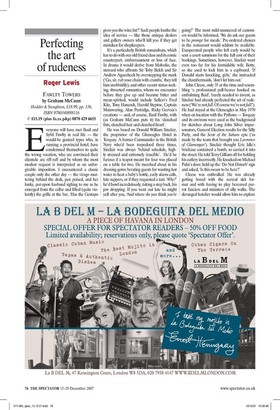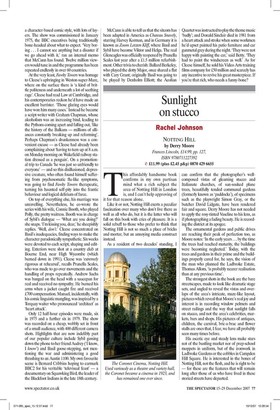Perfecting the art of rudeness
Roger Lewis FAWLTY TOWERS by Graham McCann Hodder & Stoughton, £18.99, pp. 336, ISBN 9780340898116 © £15.19 (plus a.xx p&p) 0870 429 6655 Everyone will have met Basil and Sybil Fawlty in real life — the would-be genteel types who, in running a provincial hotel, have condemned themselves to quite the wrong vocation, who are convinced their clientele are riff-raff and by whom the most modest request is interpreted as an unforgivable imposition. I encountered a classic couple only the other day — the virago muttering behind the desk, pen poised, and her lanky, put-upon husband sighing to me as he emerged from the cellar and lifted (quite violently) the grille at the bar, 'Has the Gestapo given you the wine list?' Such people loathe the idea of service — like those antique dealers and gallery owners who'll kill you if they get mistaken for shopkeepers.
It's a particularly British conundrum, which has to do with our old friend class and its comic counterpart, embarrassment or loss of face. In drama it would derive from Malvolio, the steward who affronts Sir Toby Belch and Sir Andrew Aguecheek by overstepping the mark (Go, sir, rub your chain with crumbs,' they tell him snobbishly); and other recent status-seeking, thwarted romantics, whom we encounter before they give up and become bitter and mean-spirited, would include Sellers's Fred Kite, Tony Hancock, Harold Steptoe, Captain Mainwaring, Alan Partridge, Ricky Gervais's creations — and, of course, Basil Fawlty, with (as Graham McCann puts it) his 'clenched fists, clenched hair and clenched heart'.
He was based on Donald William Sinclair, the proprietor of the Gleneagles Hotel in Torquay. A former Commander in the British Navy who'd been torpedoed three times, Sinclair was always 'behind schedule, highly stressed and extremely irascible'. He'd be furious if a teapot meant for four was placed on a table for two. He marched about in his dressing-gown berating guests for wanting hot water to heat a baby's bottle, early alarm calls, late suppers, or if they requested a taxi. 'Why?' he'd howl incredulously, taking a step back, his jaw dropping. If you went out late he might yell after you, 'And where do you think you're going?' The most mild-mannered of customers would be informed, 'We do ask our guests to be prompt for meals.' Pre-ordered choices in the restaurant would seldom be available. Exasperated people who left early would be sent a court summons for the full cost of their bookings Sometimes, however, Sinclair went even too far for his formidable wife Betty, so she used to lock him in a cupboard. 'If Donald starts knocking, girls,' she instructed the chambermaids, 'don't let him out.'
John Cleese, only 35 at the time and resembling 'a professional pall-bearer hooked on embalming fluid', barely needed to invent, as Sinclair had already perfected the art of rudeness ('We're notfull. Of course we're notfull!'). He had stayed at the Gleneagles in May 1970 when on location with the Pythons — Torquay and its environs were used as the background for sketches about Long John Silver impersonators, General Election results for the Silly Party, and the Scott of the Sahara epic (as made by the team that brought you Lawrence of Glamorgan'). Sinclair thought Eric Idle's briefcase contained a bomb, so carried it into the street. He told Terry Gilliam off for holding his cutlery incorrectly. He knocked on Michael PalM's door, held up the 'Do Not Disturb' sign and asked, 'Is this meant to be here?'
Cleese was enthralled. He was already getting bored with the surreal skit format and with having to play bereaved parrot fanciers and ministers of silly walks. The deranged hotelier would allow him to explore a character-based comic style, with lots of layers. The show was commissioned in January 1975, the BBC executives being traditionally bone-headed about what to expect. 'Very boring. . . I cannot see anything but a disaster if we go ahead with it,' ran an internal memo that McCann has found. Twelve million viewers would tune in and the programme has been repeated endlessly in over 60 countries.
At the very least, Fawlty Towers was homage to Cleese's upbringing in Weston-super-Mare, where on the surface there is 'a kind of brittle politeness and underneath a lot of seething rage'. Cleese had read Law at Cambridge, and his contemporaries reckon he'd have made an excellent barrister. 'Those glaring eyes would have won him many cases.' Instead he became a script-writer with Graham Chapman, whose alcoholism was an increasing bind, leading to the Pythons coming apart and falling out, 'like the history of the Balkans — millions of alliances constantly breaking up and reforming'. Perhaps Chapman's drunkenness was a convenient excuse — as Cleese had already been complaining about 'having to turn up at 8 a.m. on Monday morning on Wakefield railway station dressed as a penguin'. On a promotional trip to Canada 'he was just so unfriendly to everyone' — and so this disillusioned, depressive creature, who often found himself suffering from psychosomatic flu-like symptoms, was going to find Fawlty Towers therapeutic, turning his haunted self-pity into the frantic behaviour and logical delirium of farce.
On top of everything else, his marriage was unravelling. Nevertheless, he co-wrote the series with his wife, Connie Booth, who played Polly, the pretty waitress. Booth was in charge of Sybil's dialogue — 'What are you doing?' she snaps. 'I'm kissing you, dear,' he sheepishly replies. 'Well, don't.' Cleese concentrated on Basil's inadequacies, finding ways to make the character paradoxically sympathetic. Six weeks were devoted to each script, shaping and editing. Exteriors were shot at a country club at Bourne End, near High Wycombe (which burned down in 1991). Cleese was 'extremely rigorous at rehearsal', recalls Prunella Scales, who was made to go over movements and the handling of props repeatedly. Andrew Sachs was banged on the head with a saucepan for real and received no sympathy. He burned his arms when a jacket caught fire and received £700 compensation. Manuel, incidentally, with his comic linguistic mangling, was inspired by a Torquay waiter who pronounced 'architect' as 'heart attack'.
Only 12 half-hour episodes were made, six in 1975 and a further six in 1979. The show was recorded on a cheap, wobbly set in front of a small audience, with 400 different camera shots. Highlights that are now indelibly part of our popular culture include Sybil gassing down the phone to her friend Audrey (I know, I know') and Basil goose-stepping, not mentioning the war and administering a good thrashing to an Austin 1100. My own favourite scene is Bernard Cribbins hoping to earmark BBC2 for his veritable lelevisual feast' — a documentary on Squawking Bird, the leader of the Blackfoot Indians in the late 18th century.
McCann is able to tell us that the sitcom has been adapted in America as Chateau Snavely, starring Harvey Korman, and in Germany it is known as Zoom Letzten Kliff, where Basil and Sybil have become Viktor and Helga. The real Gleneagles was officially reopened by Prunella Scales last year after a £1.5 million refurbishment. Other trivia to cherish: Ballard Berkeley, who played the dotty Major, once shared a flat with Cary Grant; originally Basil was going to be played by Denholm Elliott; the Aeolian Quartet was instructed to play the theme music `badly'; and Donald Sinclair died in 1981 from a heart attack and stroke when some workmen he'd upset painted his patio furniture and car gunmetal grey during the night. 'They were not happy with painting the car,' said Betty. 'They had to paint the windscreen as well.' As for Cleese himself, he sold his Video Arts training films company for £50 million and scarcely has any incentive to revive his great masterpiece. If you're that rich, who needs a funny-bone?


































































































 Previous page
Previous page